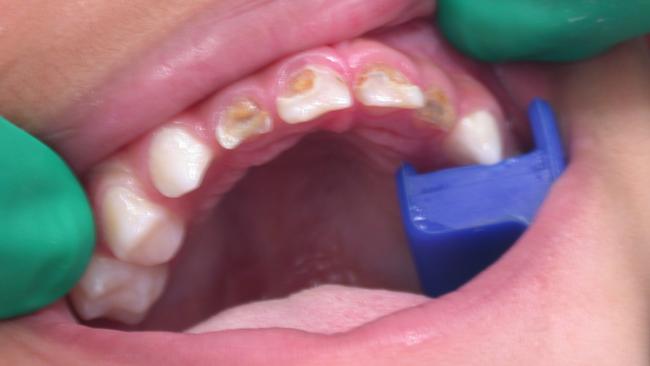Tooth decay Qld: Shock stat adds momentum to fluoride push
A growing dental crisis among Queensland’s youngest has lent added urgency to a push for mandatory water fluoridation.

QLD News
Don't miss out on the headlines from QLD News. Followed categories will be added to My News.
Half of Queensland children aged five to 10 have decay in their baby teeth, shocking new data shows, as dentists and doctors ramp up their warnings that water fluoridation across the state needs to be the government’s top priority.
Queensland Health has launched its first ever plan to address the growing crisis amid revelations that hospitals are clogged with almost 20,000 patients each year with preventable oral health problems.
Chief dental officer Ben Stute, who revealed the data on Wednesday, said the new statewide Oral Health Services Plan would target schools with more screening of students and early intervention.
Dr Stute said tooth loss, dental decay, gum disease and oral cancer were becoming a scourge.
The Australian Medical Association Queensland and the Australian Dental Association Queensland meanwhile have written to Health Minister Tim Nicholls calling for an urgent statewide mandate on water fluoridation.
“Consistent and reliable evidence has proven that community water fluoridation can help reduce tooth decay by up to 44 per cent in children and 27 per cent in adults,’’ AMAQ president Nick Yim said.
Dr Stute said the four-point plan was tailored to meet the challenges of delivering dental care in a large, decentralised state.
“It provides a renewed focus on increasing oral health service access to the state’s rural and remote areas, with a focus on encouraging eligible people to access public oral health services in underutilised regions, as well as promoting practical ways to maintain oral health across all ages,” he said.
“We know in a place as decentralised as Queensland, there are often infrastructure and workforce challenges in providing health services, and Queenslanders may experience a lack of accessible and affordable transport options to access services.

“This plan outlines actions to increase access to public oral health services for eligible Queenslanders, such as better utilising virtual care, increasing our workforce particularly in rural and remote areas, implementing more outreach services and utilising practitioners from the private sector.
“We are very interested in exploring how new digital technologies can support oral health in Queensland, including digital imaging, digital impressions and 3D printing.’’
The plan also focused on more health promotion, education and health literacy.
“We’re particularly keen to ensure young Queenslanders establish good oral health habits from early childhood as this sets them up to continue these habits into adulthood,” he said.
“That’s why we will be looking into developing stronger partnerships with schools to deliver oral health promotion, screening and early intervention services to children.”
Dr Stute said it was hoped the new plan would lead to more Queenslanders attending oral health check-ups for preventive and general care.
But Dr Yim said that oral health is a complex issue and extends beyond access to services.
“There are large numbers of patients in regional and rural communities that require dental care but are unable to access it due to the many barriers,’’ he said.
“This backlog must be cleared before we will be able to see health equity.’’
Experts said people could greatly improve their oral health by brushing twice a day with fluoridated toothpaste, daily flossing, quitting smoking, regularly seeing a dentist and cutting back on sugar and alcohol.
Children are eligible for public dental services if they are aged four years or older and have not completed Year 10, or hold a Centrelink concession card or are eligible for the Child Dental Benefits Schedule.
Adults are eligible for public dental services if they hold a current Centrelink concession card or a Queensland Seniors Card.
Originally published as Tooth decay Qld: Shock stat adds momentum to fluoride push





